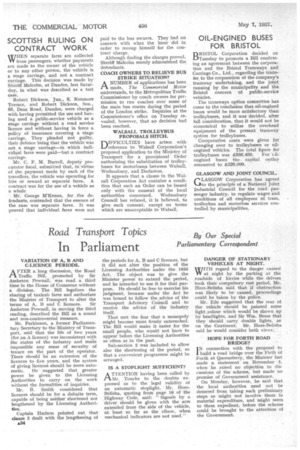Road Transport Topics By Our Special In Parliament Parliamentary Correspondent
Page 52

If you've noticed an error in this article please click here to report it so we can fix it.
VARIATION OF A, B AND C-LICENCE PERIODS.
A FTER a long discussion, the Road
Traffic Bill, promoted by Sir Assheton Pownall, was read a third time in the House of CommOns without a division. The Bill legalizes the sharing of taxicab fares and authorizes the Minister of Transport to alter the terms of A, B and C licences. Sir Assheton Pownall, in moving the third reading, described the Bill as a sound and non-controversial measure.
Mr. Parkinson, a former Parliamentary Secretary to the Ministry of Transport, said that the life of two years (for an A licence) was inconsistent with the status of the industry and made impossible any sense of security of tenure on the part of the operator. There should be an extension of the licences to five years, and the system of giving licences should be more automatic. He suggested that greater power be given to the Licensing Authorities to carry on the work without the formalities of inquiries.
Mr. B. Smith considered that licences should be for a definite term, capable of being neither shortened nor lengthened by the Licensing Authorities.
Captain Hudson pointed out that clause 2 dealt with the lengthening of the periods for A, B and C licences, but it did not alter the position of the Licensing Authorities under the 1933 Act. The object was to give the Minister power to extend the period, and he intended to use it for that purpose. He should be free to exercise his judgment, because under the Act he was bound to follow the advice of the Transport Advisory Council and to receive the advice of the industry itself.
That met the fear that a monopoly might become more firmly entrenched. The Bill would make it easier for the small people, who would not have to appear before the Licensing Authorities as often as in the past.
Sub-section 2 was included to allow also the shortening of the period, so that a convenient programme might be arranged.
IS A STOPLIGHT SUFFICIENT?
ATTENTION having been called by Mr. Touche to the doubts expressed as to the legal validity of an automatic stoplight, • Mr. HoreBelisha, quoting from page 16 of the Highway Code, said: "Signals by a driver should be given with the arm extended from the side of the vehicle, at least so far as the elbow, when mechanical indicators are not used."
DANGER OF STATIONARY VEHICLES AT NIGHT. WITH regard to the danger caused W at night by the parking at the roadside of lorries while the drivers took their compulsory rest period, Mr. Hore-Belisha said that if obstruction was likely to be caused, proceedings could be taken by the police.
Mr. Ede suggested that the rear of the vehicle should be painted some light ,colour which would be shown up by headlights, and Sir Wm. Brass that they should carry double lights, as on the Continent. Mr. Hore-Belisha said he would consider both views.
HOPE FOR FORTH ROAD BRIDGE?
IN connection with the proposal to I build a road bridge over the Firth of Forth at Queensferry, the Minister last made a statement on November 5, when he raised no objectiOn to discussions of the scheme, but made no promise of Government assistance.
On Monday, however, he said that the local authorities need not be deterred from taking such preliminary steps as might not involve them in material expenditure, and might seem to them expedient, before the scheme could be brought to the attention of the Government.




















































































